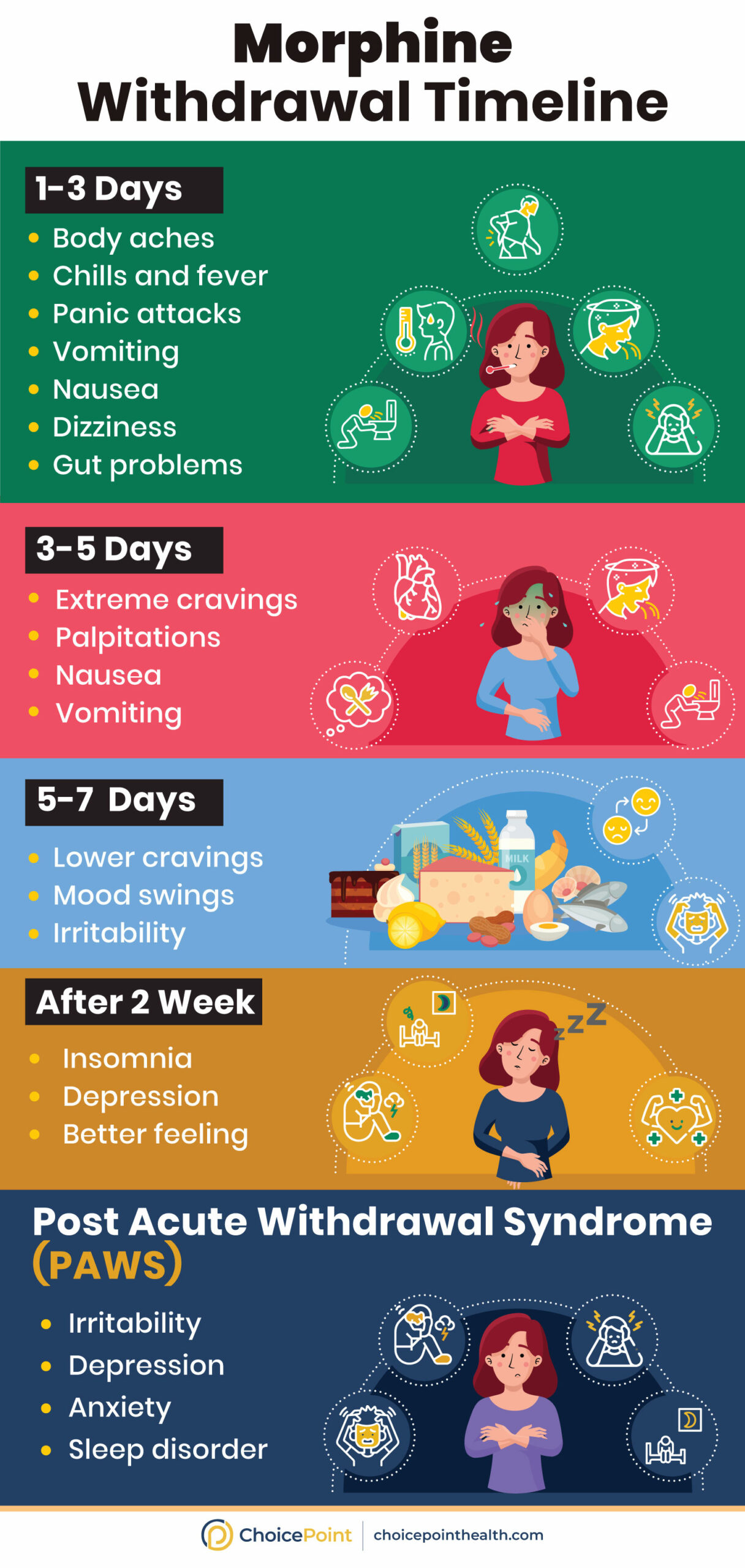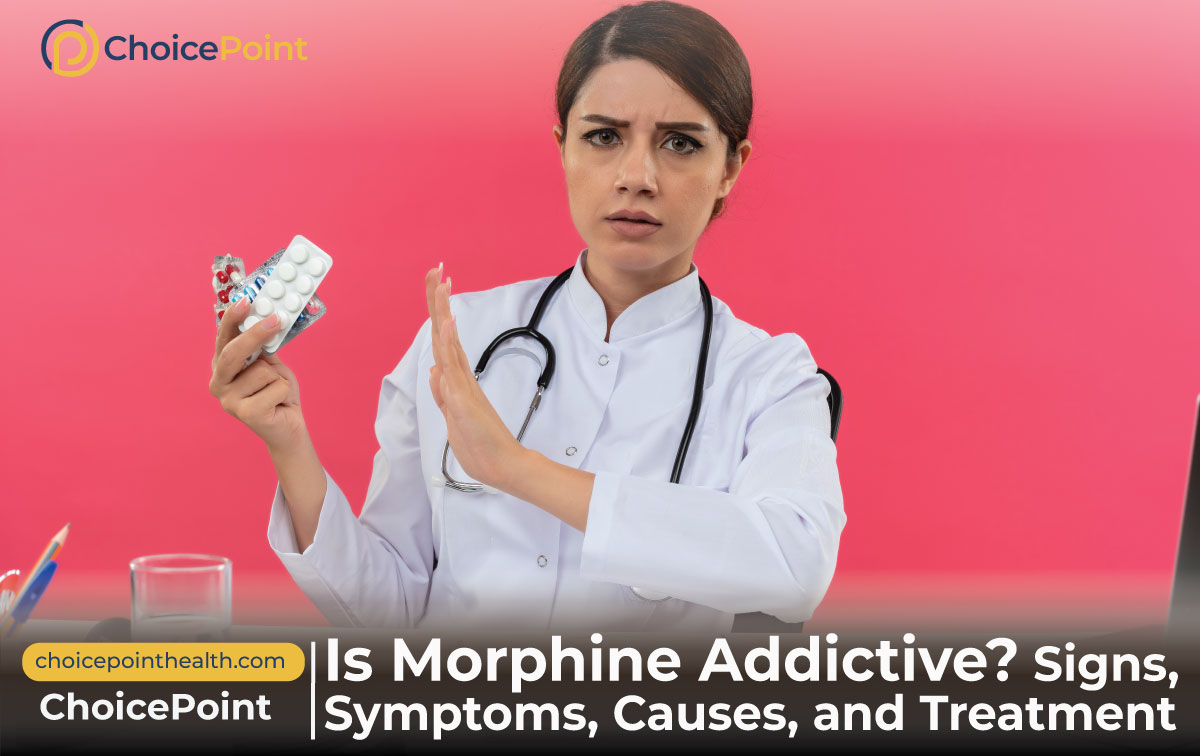Morphine addiction has become a nightmare of the opioid epidemic in the United States. It is one of the most dangerous prescription opioids, leading to the death of more than 16,000 people in 2021. People using it often wonder, “Is Morphine addictive?”. However, the lack of proper guidance and ignoring the common facts about the drug consequences makes them dependent. Let’s find out what Morphine is, how you get addicted, and how its treatment works.
For inpatient services for Morphine addiction treatment in Virginia, Maryland, and Washington, DC. Get in touch 844.445.2563 with ChoicePoint for expert guidance!
Table of Contents
What Is Morphine?
Morphine (opiate) is from physicians’ prescription drugs for pain relief. But in the meantime, people often get used to its brain-rewarding capabilities and get addicted. The U.S. Drug Enforcement Administration has classified it as a Schedule II controlled substance for its dangerously addictive nature.
Common street names for Morphine include:
- Dreamer
- Emsel
- First Line
- God’s Drug
- Hows
- M.S
- Mister Blue
- Morf
- Morpho
- Unkie
Whereas, a person can administer Morphine in three forms:
- Injectables
- Immediate or extended-release tablet forms
- Oral solutions
Being a prescription drug, it is easily accessible to all, and people often mix it with other drugs to increase its effectiveness.
Is Morphine Addictive?
In simple words, Yes! Morphine is a highly addictive substance due to its euphoric nature. It also works as an antitussive activity, causing respiratory depression. It is so addictive that if a person tries to quit without the help of a healthcare provider, they may experience the following withdrawal symptoms:
- Agitated or anxious
- Body pains and cramps
- Body swelling
- High fever
- High blood pressure
- Reduced breathing rates
- Slurred speech
- Gut problems such as constipation
Having a loved one struggling with Morphine can be stressful. There’s no immediate recovery from Morphine, and it requires a gradual, carefully planned treatment in an inpatient setting that provides 24/7 care to live a Morphine-free life.
Effects of Morphine on the Brain
Morphine affects the brain, including the central and peripheral nervous system. It can induce the following symptoms if someone tries to quit without proper clinical detox or medication:
- Hallucination
- Panic attacks
- Anxiety and depression
- Memory loss
- Seizures
- Dysphoria
- Reduced cognitive and motor skills
- False euphoria
For all these reasons, psychotherapies are the best treatment one can adopt to relieve the stigma.
Is Morphine Addictive- 7 Warning Signs to Look For
Addiction is a chronic disease that impacts behavior for more drug use despite having negative consequences. Using Morphine without a prescription inevitably makes a person a Morphine addict. Other signs to look for if someone is consuming Morphine too much include:
- Increase in tolerance level
- Spending more time on Morphine hunt than usual
- Extreme cravings
- Onset of withdrawal symptoms if not consumed
- Consistent use despite having impaired familial, work, and social consequences
- Making Morphine a normal part of life, like consuming water
- Denial is the most common sign of Morphine addiction
Realizing the grave danger associated with Morphine use can be challenging and often difficult without clinical experts.

Timelines for Morphine Withdrawal
How Long Does It Take To Get Addicted to Morphine?
“First, you take a drink, then the drink takes a drink, then the drink takes you.”
– Francis Scott Key Fitzgerald
There is no definite timeline of how much time or doses of Morphine will take to get a person addicted. One may develop with a few doses, and other may require much more time depending on:
- Genetic
- Family history
- Body chemistry
- Presence of co-occurring disorder
- Past traumas
- Surrounding environment
However, if Morphine stays for a longer period in the system, addiction to the substance may develop faster. No one is destined to develop a quick addiction, but nobody is immune. Morphine addiction never makes it resilient; one can never fight back with a little professional help.
Want to unveil the answer to” Is Morphine addictive?”, contact ChoicePoint DEA-certified practitioners now! If you want your other addiction-related queries addressed, contact 844.445.2563.
Morphine Addiction Treatment
Prescription opioids such as Morphine, fentanyl, hydrocodone, and oxycodone are the source of almost 50% of misused opioids, including Morphine. Morphine addiction is progressive and becomes fatal if no timely action is taken.
Morphine addiction treatment in inpatient settings helps a person heal physically, psychologically, and emotionally through certain defined steps by a certified rehab center.
Detox: Managing Morphine Withdrawal Symptoms
Morphine detox can be cumbersome if not governed by medical professionals. A person may experience physical and psychological withdrawal symptoms that require complete attention and care. Medications such as Buprenorphine may be administered to treat withdrawal symptoms that appear anywhere during the 1-10 days detox.
Dual Diagnosis: Managing Morphine Addiction With Counseling
At the given time, 1 out of every 4 individuals struggles with mental health disorders and drug addiction. Morphine serves as an atomic bomb for mental health disorders such as PTSD, anxiety, and depression if untreated.
For this reason, Dual diagnosis helps in reviving and clearing a person through holistic treatment with the help of psychotherapies such as
- Cognitive behavioral therapy (CBT) to improve the negative mindset and change it to a positive one so Morphine dependence can be overcome.
- Dialectical behavioral therapy (DBT) alleviates heightened emotions so people don’t feel Morphine cravings.
Addiction Counseling for Morphine Dependence
Many people psychologically depend on Morphine due to its reward-giving nature. They also get cut off from outside world relations due to their love for Morphine. Different psychological approaches may prevent all that through:
- Individual therapy for personality disorders
- Group therapy for social anxiety
- Family therapy for impaired familial relationships
Medication-assisted Treatment for Preventing Relapse and Cravings
During treatment, pharmacological approaches aim to work as agonist-antagonists on morphine receptors in the brain to alleviate psychological dependence and normalize brain function. FDA-approved medications that can be used as maintenance include:
Practitioners may dispense these and other medications under MAT required for Morphine withdrawal according to onsite symptoms that a person may experience during or after detox.
It’s not about finding out if Morphine is addictive or not! One should always seek medical help if they overuse a substance; you can assess yourself or your loved one by taking a ChoicePoint Free addiction evaluation test!
ChoicePoint- Inpatient Morphine Addiction Rehab
We have the solution to your worrisome query of whether Morphine is addictive. If you are struggling with Morphine addiction or you have co-occurring disorders. Get yourself pampered care through Choicepoint inpatient drug rehab. We offer same-day prescription and different addiction treatment programs, including.
- Inpatient
- Outpatient
- Intensive Outpatient
- Specialized treatments for students, veterans, expecting mothers, and criminal justice
We offer various options for your treatment payment, including:
- Personal funds
- Tricare
- Commercial Insurance
You can verify your insurance and discuss your treatment options before you begin 844.445.2563. Our services are available in Maryland, Virginia, Washington DC, and South Jersey.
FAQs About Morphine Addiction
Learn about Morphine abuse and treatment-related queries;
Can You Overdose on Morphine?
A person consuming regular Morphine may overdose and experience the following:
- Unresponsiveness to pain
- Seizures
- Respiratory problems
- vomiting
Can Morphine Worsen Depression or Anxiety?
Yes! Morphine is highly reactive to brain disorders due to its euphoric and analgesic effects it may trigger depression when overdosed or quit suddenly may induce persistent anxiety.
Can I Overcome Morphine Addiction?
A person can overcome Morphine addiction through
- Timely accessing dependence symptoms
- Consulting with professionals
- Getting regular counseling for mental health disorders that may cause Morphine addiction
How Long Does Morphine Last?
Morphine usually lasts 30-60 minutes, but depending on the circumstances like addiction, severity, and usage timeline, it may last even longer.
What Are the Names of Tablets Morphine?
Brand names of Morphine in tablet forms are
- MST
- Zomoprh
- Sevredol
- Morphgesic
- MXL
- Oramorph
What Drugs/medications Are Similar to Morphine?
Some opioids have similar effects to Morphine in relieving pain, such as:
- Meperidine
- Hydromorphone
- Oxymorphone
- Methadone
- Fentanyl
- Large doses of oxycodone (OxyContin)
Medical Disclaimer:
ChoicePoint aims to improve the quality of life for people struggling with substance use disorder and mental health issues. Our team of licensed medical professionals research, edit and review the content before publishing. However, this information is not intended to be a substitute for professional medical advice, diagnosis, or treatment. For medical advice please consult your physicians or ChoicePoint's qualified staff.











Review Is Morphine Addictive? Signs, Symptoms, Causes, and Treatment.